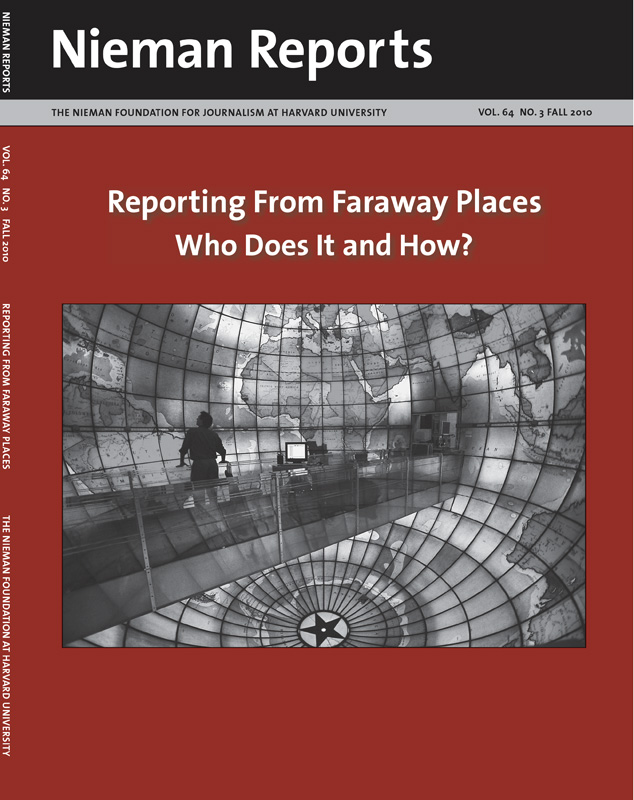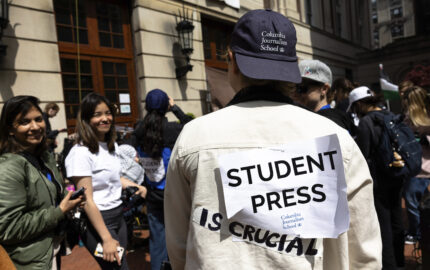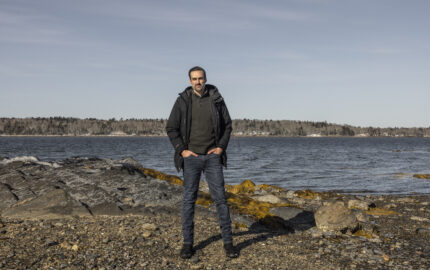
War correspondent Kevin Sites enters a U.S. Army Buffalo, a military vehicle used to search for roadside bombs, prior to a mission with the 20th Engineer Battalion. Photo by Ben Brody.
The sun is a tea bag dipping into the Pacific seeping orange and reds onto the horizon. Scattered surfers catch the meager waves of this summer evening while members of a fitness boot camp do crunches near a homeless man sleeping under a tree. I’m running with my girlfriend along a bluff next to Ocean Avenue. It’s in the 70’s with a soft onshore breeze that makes the palm leaves shudder above our heads. We keep an easy pace—chatting about what happened during our day. She is preparing for a half-marathon in Seattle. I’m preparing to go to Afghanistan—for the fourth time.
This is how I go to war. I pretend I’m not. It’s always in my forebrain, as involuntary as breathing or my heartbeat—but I keep the gear and duffle bags in the closet until I absolutely have to pull them out.
In my past relationships, I never talked about going. The resulting sadness would overwhelm the short time we had left so we avoided the topic until it hung over us like a raincloud, finally spilling its contents on our drive to the airport, too late to be constructive or cathartic. My girlfriend now will have none of that. She is small and feisty, bull-charging awkward moments like they were San Fermin revelers on the streets of Pamplona. She wants me to talk about it, share my excitement, even though it makes her sad.
Still, my instinct is to tamp it down. So I wait until she’s at work to look at my cameras, lay out the three sets of quick-dry pants and shirts that I will rotate wearing for the next two months. I place on the bed my pocket multitool that can cut, carve, pull and open nearly anything; my ballistic sunglasses that the manufacturers say will deflect shrapnel; my compass and carabiners; my fireproof Nomex gloves so, if I need to, I can open the door of a burning Humvee. I have a 100-foot parachute cord that I will cut and use to do everything from replacing boot laces to making a clothesline for a quick dry after washing. I have pens, a khaki baseball cap, a 60-day supply of vitamins, a power strip to recharge batteries for cameras, a satellite modem that connects to my laptop and allows me to transmit my stories from nearly anywhere in the world. My space-age tripod folds flat for packing and its removable leg will serve a dual purpose as an extension boom for my camera to videotape over walls and around corners. I’ve also discovered that it’s a nice gadget to have if someone is shooting at you.
I double-check that I have backup USB cables to download my video and still pictures. And there is the first aid kit with the large trauma pad that soldiers advise me to carry, and so I do, in my right rear pocket. Widely known to most American troops at least, this kit is the first place to look for something to staunch the bleeding in case of a shooting incident.
To paraphrase the title of Tim O’Brien’s classic book about the war in Vietnam, these are the things I carry when I head off to report a war.
This baggage is physical and psychological. These things allow me to do my job but also transform me into a beast of burden—the price of being a backpack journalist. I struggle even under the liberation of the lighter digital gear while heading into the new journalistic paradigm, which is turning the only job I’ve ever known firmly and distinctly on its head.
What I Leave Behind
Every time I leave for war, there are rituals and routines—and one unyielding truth.
While my packing routine is deeply ingrained in muscle memory, the rituals of this preparation seem as distinct and different to me as each child is to a mother. What has changed for me are the circumstances I will leave behind. No longer am I responsible only to myself; I’m enmeshed in a party of five, living with my girlfriend, her sister, and their daughters—one nine, the other five. Because my only job is to prepare to go to war, I’ve taken an active role in the daily care of the girls. I make breakfast, take them to school, get them snacks when the school day is over, and talk and play with them while I pack and prep for my looming deployment.
Pushing my loaded cart down the grocery store aisle as I pick out maple-flavored oatmeal and cat-shaped cookies, I jokingly text my girlfriend about how I’ve gone from being a war correspondent to a desperate housewife. She’s empathetic but relentlessly practical. Do the job in front of you, she reminds me by example, and not the one you want to do—in my case, a job that garners the attention despite its inherit selfishness.
Going to war, I know, will result in me thinking only of myself again, as everyday things like paying bills and feeding kids get pushed aside. The problem is that I have found my short month of domesticity so lopsidedly more rewarding than my supposedly adventurous life in conflict. At moments, it occurs to me that perhaps I feel this way because I’ve had the luxury of experiencing too little of the first and too much of the second.
This time, before I go, there are things I need to do as a family member, and not just as a person who soon will do what is easy for me—tell stories that can almost tell themselves. After all, war is a ready-made drama, packed with moral dilemmas and the inevitable struggle to stay human in the face of killing and dying. Right now, I need to write and notarize my will, buy presents for birthdays I’ll miss, schedule online payments, and extend credit cards slated to expire in my absence.
My Departure
Even as I move through my to-do list, it grows lengthier as I think of other things I need to do. In the past, working for NBC and CNN, even for Yahoo! News, I had administrative support and producers. People booked my business class tickets overseas and expedited my foreign visas. They then handed me briefcases of cash to keep our war zone news bureaus running.
This trip signifies the irreversible changes in the foreign coverage model in which freelance operators like me are the rule, not the exception. Unlike the past, when I simply went to a conflict area and did the job and got paid for it, now I cover all of my own costs upfront and try to pay it off one story at a time. I must fill out applications for my Afghan visa and pay for it, apply for a spot as a U.S. military embed, buy my flight tickets from Los Angeles to Kandahar, Afghanistan, and upgrade my gear. Though I never wore a helmet—and rarely wore body armor—on past assignments, the U.S. military now requires it for journalists seeking to embed so I need to buy both.
After finding what I consider to be a reputable supplier online, I spend one morning talking with Steve at Bullet Proof Me. He walks me through the process of measuring “sweet spots,” where vital organs reside, that I need to make sure are properly covered. While he finds me the proper ballistic panels (the material that actually stops the bullets), they do not have the outer shell or carrier in stock. I need to custom order it and with only two weeks to go before my deployment, it will be a tight turnaround.
In my last week before departure, things start to unravel. When I’m at REI buying some last minute items, my credit card is declined. When I talk with a customer service rep, I find out that someone in Germany has been using my card to play online video games. I cancel the card with the promise that a new one will arrive via FedEx on Thursday morning.
That’s the day I’m scheduled to leave, and it’s also the day my body armor vest is slated to arrive.
That morning I make the girls breakfast and they give me drawings they did on index cards that I tell them I will carry to Afghanistan. As I hold tight to my girlfriend, I assure her that we’ll be in contact regularly through e-mail. Before she leaves for work, she asks me to show her the lucky charm I wear around my neck—an Iraqi dog tag I found in the dirt on the day I was captured in Tikrit by Saddam Hussein’s Fedayeen militia soon after the invasion. I’ve worn it or carried it on every deployment since.
I know I have it somewhere, but I can’t find it. Go to work, I tell her, and I’ll find it and e-mail a photo of me wearing it. It’s not a solution that satisfies her so as I tear open my well-packed gear, the tension becomes more frantic. She tosses things from my closet, looks under the bed. Finally, I find it in the crevice of my gear bag.
“I’ve got it,” I shout, pulling it over my head. I rush upstairs and soon she is crying with relief as I embrace her.
It’s a dangerous thing to imbue an inanimate object with so much power.
A few minutes later, a FedEx truck pulls up with my new credit card and my bulletproof vest. One of the girls’ drawings is deposited in an opening in the front, the other in back, as I tell them how they will protect me from both sides. Under my helmet’s webbing I slide a photograph of my girlfriend, the one I asked her to choose. It is from an unforgettable day on the beach when the ocean breeze tossed her hair around her face.
After she leaves for work, I repack, and then head to the airport. The next thing I realize is that the pop singer Seal is in the security line next to me. As he and I go through the screening machines and then pull our belts and shoes back on, I smile, thinking how the Transportation Security Administration (TSA) is now our great equalizer.
Suddenly and weirdly, one of the TSA supervisors yells “bravo.” Others answer back with the same. We are told to move away from the screening machines and freeze in place, which in that moment makes all of this seem almost like a child’s game. It’s five minutes before I hear someone yelling “clear.” Magically, we are unfrozen and proceed to our gates.
The first of Sites's reports for GlobalPost, “9 years on, the same war in Afghanistan,” is available online.It’s at this point, heading to my gate, that I begin to feel like a bag of sand being dragged across the ground and through a small hole, losing all the things that give me shape and substance. Despite the draining loneliness I feel, I know in my heart it’s much easier for those of us who leave than for those who are left behind.
Kevin Sites, a 2010 Nieman Fellow, is the author of “In the Hot Zone: One Man, One Year, Twenty Wars,” based on his reporting for Yahoo! News. His next book, which is about the isolating experiences of war, is titled “The Things They Cannot Say,” and will be published by Harper Perennial in 2011. His war reporting can be seen at http://hotzone.yahoo.com and www.kevinsitesreports.com.


